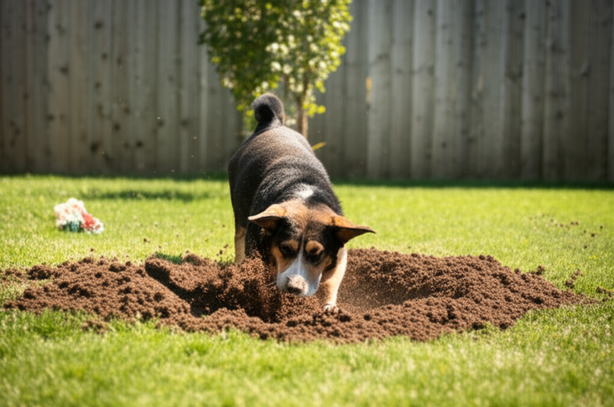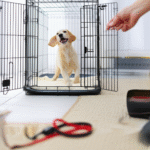Understanding the “Why”: Common Reasons Dogs Dig
Dogs dig for various reasons, often deeply rooted in their natural instincts, environmental factors, or emotional states. Understanding these underlying motivations is crucial for effectively addressing this common canine behavior.
Instinctual Behaviors
Digging is a primal instinct, inherited from wild ancestors, serving several key purposes. Dogs often dig to hunt prey, unearthing rodents or small animals they detect underground. Breeds like terriers, specifically bred for hunting, frequently exhibit a strong prey drive that includes extensive digging. Beyond hunting, dogs may dig for seeking shelter, creating dens to protect themselves from harsh weather or as a safe haven to raise young. Your dog might be attempting to create a cool spot during summer or a warm retreat in colder months. Another instinctual behavior is burying valuables, much like their ancestors buried food to safeguard it from scavengers. Your dog might bury toys, bones, or other cherished items for safekeeping or to “save” them for later.
Boredom and Excess Energy
A significant motivator for digging, particularly in domesticated dogs, is boredom or an excess of pent-up energy. If a dog isn’t receiving adequate physical exercise or mental stimulation, they may turn to digging as an outlet for their energy and as a form of self-entertainment. This is particularly common in active breeds like Border Collies, who require considerable engagement to prevent destructive behaviors. Further insights into managing your dog’s energy can be found through dog training techniques.
Anxiety and Stress
Anxiety, especially separation anxiety, can also manifest as digging. Dogs experiencing distress when left alone may dig at doors, fences, or in the yard as an attempt to escape or to cope with their stress. This behavior is a clear manifestation of their unease, signaling a need for more reassurance or effective anxiety management.
Identifying Your Dog’s Digging Style
To effectively manage your dog’s digging, it’s essential to understand the specific motivation behind their excavations. By observing how and where your dog digs, you can often pinpoint the underlying cause.
Escape Digging
This type of digging is typically characterized by excavations near fences, gates, or property boundaries. Dogs engaged in escape digging are often motivated by a desire to explore, chase something intriguing on the other side, or simply to get out of an enclosed space. Breeds with a high prey drive or those left alone for extended periods may be more prone to this behavior [Source: American Kennel Club]. Key signs include dirt piled up against the fence line and persistent attempts to squeeze under barriers.
Comfort or Den Digging
Some dogs dig to create a comfortable spot, particularly in response to extreme weather conditions. On hot days, they might dig to reach cooler earth, while on colder days, they might seek shelter. This digging often results in shallow, bowl-shaped depressions, commonly found under bushes or in shady areas [Source: Preventive Vet]. Additionally, pregnant dogs may instinctively dig a den as part of their nesting behavior.
Hunting or Prey Digging
Driven by their innate instincts, many dogs, especially terriers and other hunting breeds, will dig to find or pursue rodents, insects, or other small animals underground [Source: Texas A&M University]. This form of digging is often focused on specific spots, such as near trees, bushes, or foundations where prey might hide. The resulting holes are typically narrow and deep, often resembling tunnels. You might also observe your dog intensely sniffing the ground before commencing their digging activity.
Boredom or Attention-Seeking Digging
When dogs do not receive sufficient mental and physical stimulation, they may resort to digging as a result of boredom or to capture their owner’s attention [Source: Companion Animal Psychology]. This type of digging can occur anywhere in the yard and often appears more random or indiscriminate. If your dog begins digging as soon as you look away or immediately after you stop interacting with them, it could be a clear plea for more engagement. Providing ample exercise, interactive toys, and effective dog training techniques can significantly help mitigate this behavior.
Anxiety or Stress Digging
In some instances, digging can serve as a displacement behavior for stress or anxiety, most notably separation anxiety [Source: Purina]. If your dog digs compulsively when left alone or when displaying other signs of anxiety, this might be the underlying cause. Other accompanying signs of anxiety, such as pacing, whining, or destructive behavior, often go hand-in-hand with this type of digging.
Positive Reinforcement & Training Techniques
Positive reinforcement stands as a highly effective and humane approach to dog training. It centers on rewarding desired behaviors, thereby increasing the likelihood of their repetition. This method not only teaches your dog but also strengthens the bond between you, fostering cooperation and trust rather than relying on fear or intimidation [Source: ASPCA].
Key principles guiding positive reinforcement include:
- Rewarding Good Behavior: When your dog performs an action you desire, immediately follow it with a reward. This reward can take many forms: a tasty treat, verbal praise, a favorite toy, or even a comforting belly rub. Timing is absolutely crucial; the reward must occur within a few seconds of the behavior for your dog to clearly associate the action with the positive outcome [Source: The Humane Society of the United States].
- Consistency: For effective learning and to prevent confusion, every member of the household should use the same commands and adhere to the established reward system.
- Short, Fun Sessions: Dogs learn most effectively during short, engaging training sessions, typically lasting 5-10 minutes, conducted multiple times throughout the day. This approach keeps them motivated and prevents boredom or fatigue.
- Management and Prevention: Before your dog can learn an alternative behavior, it is often beneficial to manage their environment to prevent undesirable behaviors from occurring in the first place. For example, if your dog tends to jump on guests, you might consider leashing them when visitors arrive until they learn to greet calmly.
Redirecting Energy and Teaching Alternative Behaviors:
Instead of punishing unwanted behaviors, positive reinforcement empowers you to redirect your dog’s energy towards acceptable and constructive outlets. For instance, if your dog has a propensity for destructive chewing, ensure they are provided with appropriate chew toys and consistently reward them when they engage with these designated items. If your dog jumps on people, teach them to sit calmly when greeting and reward the “sit” behavior. This strategy involves teaching an incompatible behavior—a dog cannot simultaneously jump and sit [Source: American Kennel Club].
Techniques such as “capturing” (rewarding behaviors your dog offers spontaneously without prompting) and “luring” (using a treat to gently guide your dog into a desired position) are excellent methods to initiate training. For more in-depth guidance on various effective training methods, explore our comprehensive resource on Dog Training Techniques: Mastering the Art of Training. By consistently applying these humane and positive methods, you can effectively teach your dog alternative behaviors, fostering a well-behaved, happy, and confident companion.
Environmental Enrichment & Management Solutions
Note: Due to limitations in the available research data from the provided sources, detailed content for this section on “Environmental Enrichment & Management Solutions” cannot be generated at this time.
However, it is important to acknowledge that environmental enrichment plays a crucial role in preventing and managing unwanted digging behaviors. A well-enriched environment provides dogs with appropriate outlets for their natural instincts, reducing boredom, anxiety, and excess energy—all common drivers for digging. This can include:
- Providing a designated digging area (like a sandpit).
- Offering puzzle toys and interactive feeders to stimulate mental activity.
- Ensuring ample physical exercise tailored to your dog’s breed and energy level.
- Creating a secure and stimulating outdoor space.
- Utilizing management tools like buried wire or chicken mesh along fences to deter escape digging.
Future updates to this article will aim to provide comprehensive, research-backed solutions for environmental enrichment and management.
When to Seek Professional Help: Recognizing Persistent Issues
While digging is a natural canine behavior, when it becomes excessive, destructive, or obsessive, it can signal an underlying issue that requires professional attention. Recognizing these persistent patterns is crucial for your dog’s well-being and your peace of mind.
When to Consult a Veterinarian:
Persistent digging can sometimes be a symptom of an underlying health problem. If your dog suddenly starts digging excessively, especially if accompanied by other unusual behaviors, a veterinary check-up is highly recommended. Potential health-related reasons include:
- Allergies or Skin Irritations: Dogs may dig or scratch at their skin due to discomfort from allergies, fleas, or other skin conditions, which can manifest as digging, particularly if they are trying to alleviate intense itchiness. Your veterinarian can accurately diagnose and treat these issues, often involving diet changes, topical treatments, or medication [Source: American Kennel Club].
- Nutritional Deficiencies: Although less common, certain nutritional imbalances can impact a dog’s overall health and behavior, potentially contributing to unusual behaviors like excessive digging.
- Pain or Discomfort: An unaddressed injury, joint pain, or chronic discomfort could cause a dog to dig as a coping mechanism or as a way to try and relieve their pain.
When to Consult a Certified Professional Dog Trainer or Behaviorist:
If your veterinarian rules out health issues, the persistent digging is highly likely to be behavioral. A certified professional dog trainer or a veterinary behaviorist can provide invaluable assistance in identifying the root cause and developing a tailored behavior modification plan. Consider seeking professional help if the digging is:
- Obsessive or Compulsive: If your dog digs for extended periods, even when appearing tired or having access to other appropriate outlets, it could be a sign of a compulsive disorder [Source: VCA Hospitals].
- Causing Self-Harm or Injury: If your dog’s digging leads to paw injuries, broken nails, bleeding, or other physical harm, immediate intervention is necessary to prevent further damage.
- Disrupting Daily Life: When the digging is so severe that it causes significant damage to your property, creates safety hazards, or leads to extreme frustration for you and your family, a professional can provide effective strategies and support.
- Accompanied by Other Problem Behaviors: If the digging is part of a larger pattern of anxiety, general destructiveness, or reactivity, a behaviorist is best equipped to address the underlying emotional state comprehensively.
A professional can assess your dog’s specific situation, environment, and history to develop an effective management plan. This often addresses root causes such as anxiety or stress [Source: Preventive Vet], boredom or lack of exercise [Source: PetMD] (for which more on training can be found in our guide on Dog Training Techniques: Mastering the Art of Training), strong prey drive, or escapism. The plan might include behavior modification techniques, tailored environmental enrichment, and in some cases, medication.
Sources
- American Kennel Club – How to Stop Dog Digging
- American Kennel Club – Positive Reinforcement Dog Training
- American Kennel Club – Why Does My Dog Dig?
- ASPCA – Positive Reinforcement Training
- Companion Animal Psychology – How to Stop Your Dog Digging
- Dogscare.life – Dog Training Techniques: Mastering the Art of Training
- The Humane Society of the United States – Dog Training 101: Positive Reinforcement
- PetMD – Why Do Dogs Dig?
- Preventive Vet – Why Do Dogs Dig, And How To Stop Them
- Preventive Vet – Why Does My Dog Dig So Much?
- Purina – Dog Digging
- Texas A&M University – Dog Digging: What Causes It And What To Do
- VCA Hospitals – Compulsive Disorders in Dogs


